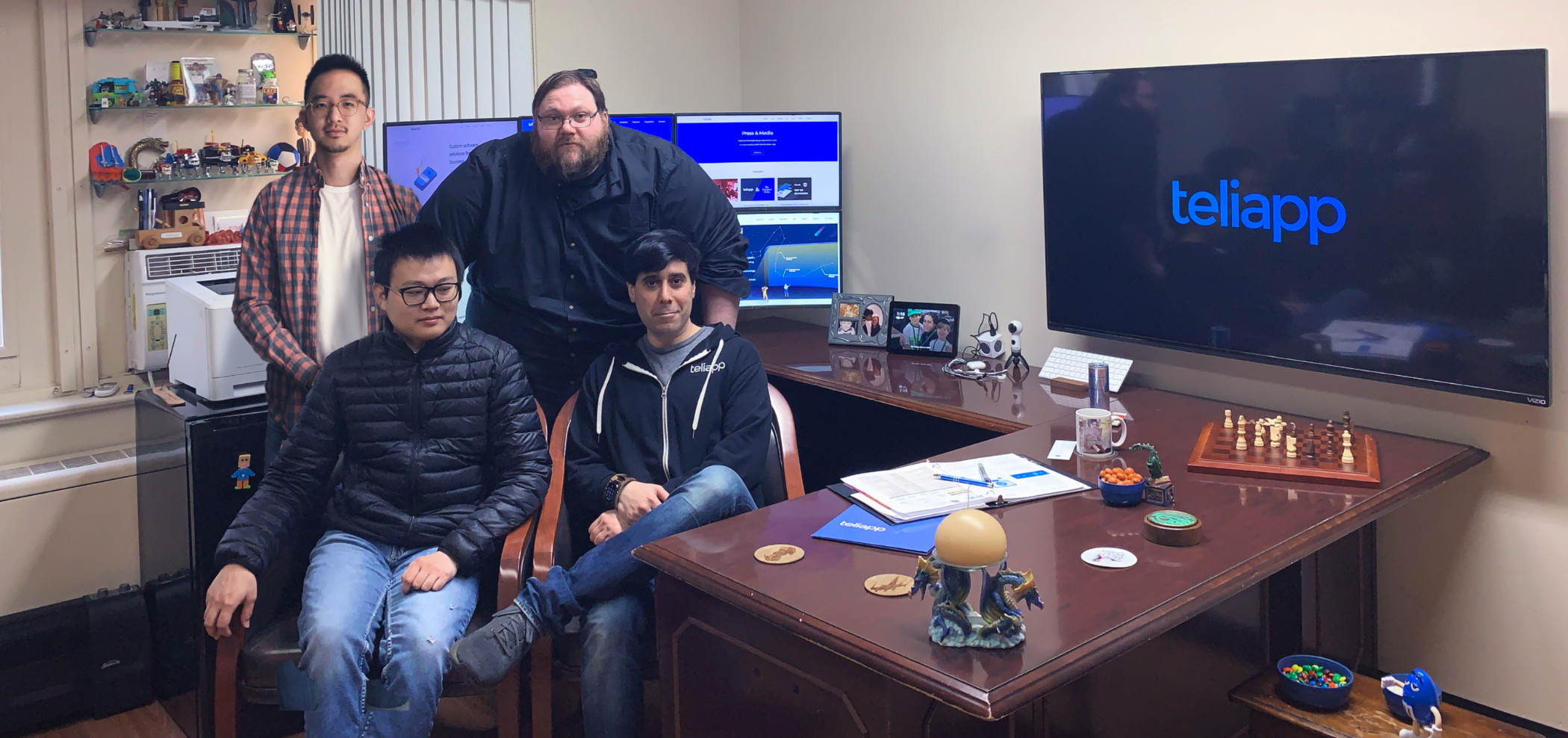TeliApp’s FetchPro is a Super Hotspot

David Hechler, Editor-InChief of TAG Cyber Law Journal (formerly known as CyberInsecurity News, talks with Joshua Weiss in an article featuring FetchPro.
“It’s the right product for the wrong reasons.”
Those were the first words out of Josh Weiss’s mouth when he started to describe FetchPro. FetchPro allows you to use your smartphone as a super hotspot to connect to the internet. But not necessarily as a temporary solution to inconvenience. It actually provides features, Weiss said, that make it better than WiFi. Like cheaper, faster and a lot more secure. It can be particularly valuable for lawyers when they’re on the road (or stuck at home).
It all started a few years ago at a Panera Bread in Edison, New Jersey. Weiss was running an early- stage tech startup, with all of the frills you would expect. His office was a coffee shop—Panera, to be specific. But he suddenly realized that he had a problem: “I can’t use Panera Bread’s WiFi, because I’m not in control of their firewall.”
When he started TeliApp Corporation in 2012, he had lots of ideas for software, and he decided it would be smart to become a federal government contractor. That would allow him to do business with the Department of Defense. One of the requirements, he’d learned, was you have to comply with NIST 800 171.
“What privilege is to attorneys, what HIPAA is to the health care industry, NIST 800 171 is to federal contractors,” he explained. It’s the Bible for learning to how to protect controlled unclassified information (CUI). “Even something as simple as a federal contract proposal can be considered CUI,” he said. And the Panera Bread WiFi was out of his control.
“All of a sudden, I found myself trying to use a hotspot and switching between AT&T and Verizon.” But neither one was working. “It’s not about the carrier,” he finally figured out. “It’s about the stability between the smartphone and the computer.” It was balky and so slow it was almost impractical to use.

The Light Goes On
That’s how it came to pass that in Edison (of all places), necessity was the mother of invention. When he told his chief technology officer about the problem, Ian Mathieson said that he’d write a program to fix it. He’d fix the stability, fix the speed and even beef up cybersecurity. The program would encrypt every web browser request Weiss made. It would block third-party tracking, and nonsecure websites wouldn’t be able to see the data on his screen. And Mathieson was as good as his word. He did all of those things.
“So the very earliest version of this solution was meant to solve our own problem,” Weiss said. “It did not occur to us that this would be something that other people would be interested in.”
That didn’t change until Weiss attended a networking event a few years ago in D.C. It was the kind where small business owners who worked with the Defense Department gathered to exchange ideas and business cards with mucky mucks. In casual conversation, Weiss recalled, some generals were complaining about a problem at work. Sometimes they would find themselves with classified or confidential information and a need to access the internet, but without a secure way to do it.
“They were looking for a solution,” he said. “And so I mentioned, ‘Hey, we wrote a program because we had the same problem. Would you like me to show you how it works?’ ”
The next day they had a coffee date. Weiss took out his phone and laptop and showed them. They were wowed. “Jesus,” one said, “you should really think about developing this, and making something I can buy.”
Back home, he talked to friends and acquaintances—lawyers, accountants. Was this something they needed? They hadn’t thought about it, but come to think of it, yes. “I connect to my client’s WiFi,” said one of his friends who worked for a large accounting firm. “But how do I know that my client’s WiFi is secure?” Some took their laptops to Starbucks. It didn’t take much mulling to recognize the risks.
A Law Firm Sees a Benefit
Elizabeth Gearhart first bumped into Josh Weiss a couple of years ago at a Morris County (NJ) Tech Meetup. She was a regular, and Weiss was there to give a presentation.
He was talking about security for banks. It wasn’t really relevant to her line of work. Her husband ran a law firm, Gearhart Law, and Elizabeth was the chief marketing officer. She’d also earned a Ph.D. in chemistry and was a licensed patent agent. But what made her want to talk to Weiss after his presentation was a sideline that she and her husband, Richard, shared. They co-hosted a weekly radio show for entrepreneurs, and they thought he’d make a good guest.
Weiss was articulate and entertaining, and they had him on their show, which was called “Passage to Profit” (WOR 710 AM), in February 2019. It went well enough that they decided to have him on again later in the year. This time they moved him up from guest to their executive spotlight slot.
In a show that aired last December 8, Weiss talked about FetchPro. Gearhart recalled that they’d discussed the product with him briefly before the show. But not in any detail. It didn’t occur to Richard that he was about to be sold. But the effect was immediate: “Josh convinced him during that show.”
How? “The product sells itself,” Gearhart said. “He explains it well.” The problem it solves wasn’t a huge one for the Gearharts. “When we were traveling,” she explained, “there was always a hassle with WiFi. We knew there was a problem, but we didn’t know there was a solution. So we didn’t acknowledge it as a big problem.”
What made Weiss’s pitch more important to the Gearharts was their business. “For us, being a law firm, what was particularly appealing was the privacy feature—not having to use public WiFi.” They work with eight attorneys. Two travel all over. “And we also have remote people who are typically at home when they’re working, but sometimes travel too.”
Those were good reasons for the firm to use the product, she said. And apparently other firms soon agreed. As of late April, thousands of professionals were using FetchPro, Weiss said—about a third of them lawyers.
Gearhart Law bought five licenses. (For a solo practitioner, the price Weiss charges is $17.99/month. Deep discounts are available for multiyear contracts for medium and large firms, he said.) All that lawyers need to do to use the product is download the software and plug in the cable. TeliApp walks customers through the software setup. Some of the commands are not obvious, Gearhart noted.
Most of the use they get out of it is when they’re on the road. And as they’ve used it, she’s come to appreciate the speed. Hotel WiFi is typically sluggish and a torture to use, Gearhart said. And during the Coronavirus pandemic, she has noticed her home WiFi slowing down as well. That never happens with Fetch, she said.
The other use she gets from the product is when she’s doing work at the radio studio. That used to be a problem. “Trying to get on the WiFi would take 15 minutes of screwing around,” she said. “This took a minute,” she added, referring to Fetch.
Timing Could Be Everything
Speed isn’t the most important feature FetchPro offers, Weiss insisted. But it’s the selling point that attracts immediate attention. “Everyone is in Corona time now, everyone is having the same problem,” Weiss said. Parents and kids are stuck at home, with all of their devices. And they’re doing multiple video conferences. They’re stretching the bandwidth of their home ISP.
“So now everyone is saying, ‘Hey, I need a different way to get to the internet. Let me try my hotspot.’ “ Only what they’re finding, he said, is that their AT&T and Verizon hotspots aren’t better. They’re worse.
When he visits a law firm to show them how the product works, a demo is what does it for them. “I connect to my iPhone, and I open up a Netflix tab, open up Hulu, I have three or four YouTube videos, and I start playing them all at the same time. And I show them the speeds I’m getting just using FetchPro.” He challenges them to do the same thing with their office WiFi.
“That’s what impresses them,” Weiss said. “That’s what they like. ‘Holy crap, it’s fast!’ ”
Later they bring in the chief information officer, who doesn’t care about all of that. He’s not interested in how many movies it can simultaneously stream. He wants to know if the data will be secure. He will ask technical questions and will want to see the product datasheet. Those are the right reasons to use the product, Weiss said.
But speed seems to be the grabber. Nobody wants to look under the hood of a race car before they’ve seen it scream around the track.
“That’s why I said,” Josh Weiss repeated, “it’s the right product for the wrong reasons.”